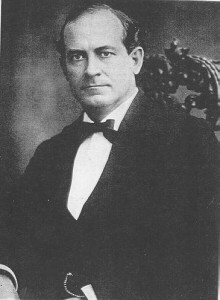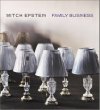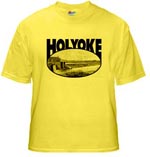by Laurel | January 11th, 2012
11 January 1902
His Lecture in City Hall on “The Conquering Nation”
Emphasizes Importance of the Moral Principle — His Plans For Today
William Jennings Bryan paid Holyoke a visit for the second time yesterday, lecturing on “The Conquering Nation” at the city hall in the evening under the auspices of the Holyoke council of the Knights of Columbus. The audience was large, though not to be compared to the throng that jammed the city hall in 1900, when, of course, great interest centered upon him as the democratic candidate for the presidency and the oratory was free. Yet by the attendance last evening an the frequent and spontaneous applause, it is evident that Mr. Bryan still retains the warm regard and affection of many Holyoke people, and his movements in Holyoke were watched by a number of interested people. During his stay in Holyoke Mr. Bryan is the guest of Lawyer T. C. Callahan, formerly chairman of the democratic state committee, at his home on Fairfield Avenue. From Holyoke Mr. Bryan goes this morning to Cambridge, where he is to deliver an address this evening before the Harvard Union. He will possibly return and spend Sunday with Mr. Callahan, though that plan was not fully decided last evening. He leaves at 9:15 this morning, taking the 9:40 train from this city.
Mr. Bryan arrived in Holyoke at 2:16 in the afternoon, and was driven directly to the West Street grammar school, the principal of the school, J. J. Lynch being the chairman of the evening. He made a short address to the children of the school and shook hands with them all as they filed out, much to their delight. The children passed very rapidly, and Mr. Bryan was obliged to use both hands. Speaking about the affair afterward, he said that it was about the quickest work he ever did, although he had shaken hands on some occasions at the rate of 3600 an hour, or one a second. From the West Street school building he was driven to the office of Mr. Callahan where he dictated letters and attended to his correspondence for an hour or so, and then was driven to the home of Mr. Callahan, where he had dinner. Shortly after 7 he took a carriage and was driven to the rooms of the Holyoke Knights of Columbus on High Street, where he held a reception until about 8, meeting many of the members and their friends informally. The reception was not confined to the members of the council, but others of the citizens were invited and made welcome.
Mr. Bryan is looking uncommonly well. In private conversation he is as ready as ever with an inexhaustible fund of stories and relates with characteristic delight adventures on his trips from one part of the country to another. In an interview with a representation of The Republican last evening he spoke with much enjoyment of his experiences in a certain part of Pennsylvania where he was given a reception. “The county,” said he, “was a solid democratic county, never known to go republican. There were being introduced to me a number of people whom I will call Bergensaw — and after a dozen or so of that name had been introduced in succession, I leaned forward and asked one of the family, “How many are there of this name in here?” “Well,” replied the man, “there is a club of Bergensaws that number 70 and I guess they are all here.” There was a picnic of the Bergensaws some time ago at which only Bergensaws and those Bergensaws who had married democrats were allowed to come; there was one family in which a girl of that name had married a republican, and by a unanimous vote he was not allowed to attend the Bergensaw picnic.
John J. Lynch presided at the meeting in the city hall, introducing Mr. Bryan in a eulogistic fashion and placing him on the list of distinguished orators that have adorned the pages of American history from colonial times to the present day. On the platform there were with Mr. Bryan besides the presiding officer of the evening C. T. Callahan and James J. O’Donnell. Mr. Kynch said that the Knights of Columbus appreciated the compliment paid by Mr. Bryan in accepting an invitation to speak a a gathering under their auspices. The spontaneity of the greeting of those present indexed to some extent at least the esteem and affection with which he was held by the people of the city of Holyoke. Mr. Bryan was a man who never had spoken harshly or unkindly or a political opponent and today was loved and venerated by millions of the people of this country. Mr. Lynch then reviewed the list of orators including those of colonial times, of early revolutionary times, and those whose eloquence had made the constitution of the United States possible and said that in the list of America’s greatest orators the name of William Jennings Bryan would ever be found. (Applause.)
Mr. Bryan, as is his wont, began in an easy conversational style, thanking those present and the Knights for the opportunity of addressing them. He had been over the country a great deal, but, owing to the circumstances under which he traveled, it had not been possible for hi to stop long or to spend any proper amount of time in discussing topics that required fuller treatment. His life would be devoted to discussing questions which affect government, and to advocating those principles which he thought were right. Criticism will doubtless be received from people who do not agree with him, but he should be on the platform from one year’s end to the other, and ample opportunity would be given for criticism. He would especially impress upon the people the importance of those principles which have made the country what it is, and by departing from which he believed the country would suffer loss. He appreciated the courtesy of New England accorded to him by the newspapers, even by those who did not agree with him, and yet who had editorially and in their news columns been generous and considerate.
Beginning his lecture, he dwelt upon the importance of the moral principle involved in every political measure. It has been a mistake, said he, to consider this or that measure as to whether it will succeed or fail. Back of every public policy lies a moral principle, and unless that moral principle be right, the rest is of little consequence. The general purpose running through this lecture was to show that this nation should be a nation of moral, rather than physical, force: that it should dominate the world with its ideas, rather than through arms.
Mr. Bryan discussed the means by which the individual could influence those about him, asserting that the highest service which a man could render to his fellows was to set them a good example. Arguing from the individual to the nation, he took the position that this nation should aspire to higher things than to the conquest of what are called the inferior races; that it should but the power of its example destroy thrones and inspire people not only to self-government, but to progress toward perfection in government. Believing that we should solve the problems of civilization for our own welfare and for the benefit of those who labor under less favorable conditions, he proceeded to lay down certain fundamental principles for the solution of all problems of government, and to apply them to several questions. He referred briefly to the principles involved in the questions of taxation, money and trusts, especially emphasizing the question of imperialism.
Mr. Bryan took up the decision in the Downs case and explained it, asserting that the reasoning of the court would, if followed out, destroy the constitutional government, because the American cannot argue that a constitution is necessary for himself, if the Puerto Rican, who neither elects Congress nor can remove it, needs no Constitution. Mr. Bryan made prominent the scriptural text which he quotes, “Be ye not overcome of evil but overcome evil with good.” In fact, throughout the lecture Mr. Bryan quoted frequently from the scriptures, explaining his frequent reference to the Bible by saying that when he quoted democratic authority his political opponents questioned his authority, so that he found it better to quote from the scriptures and leave his opponents to settle their disputes with his quotations with the Holy Writ. in speaking of the principles of imperialism, he said that no one could estimate the cost of imperialism, citing the fact that England had begun a war of conquest in South Africa and had sent 200,000 soldiers to the Transvaal to subjugate less than m5,000 Boers, and had spend more than $1000 for each Boer in South Africa — the average per capita wealth in the United States — and had not conquered them yet, and he hoped she never would.
From The Springfield Republican, image in the public domain.









